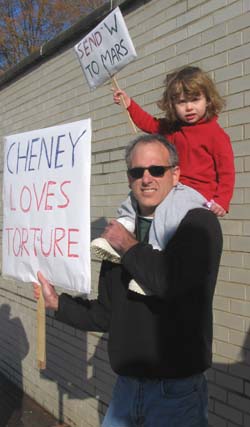| Maryland Newsline |
| Home Page |
Politics
|
Bush Requests Patience on
Iraq, Rejects Calls for Withdrawal Deadline
By Robert Salonga
ANNAPOLIS - President Bush urged more patience on troop withdrawals in Iraq Wednesday, outlining a strategy aimed at reducing U.S. forces there, but refusing to give the departure timeline demanded by his critics. "Setting an artificial deadline to withdraw would send a signal to our enemies that if they wait long enough, America will cut and run and abandon its friends," he said. Addressing an auditorium filled with Midshipmen, Bush gave the speech at the U.S. Naval Academy in part to clarify what critics have called a muddled message on how his administration plans to transfer security responsibilities to Iraqi forces and exit the region. It comes at a time when American fatalities there have passed 2,100, public discontent with the war is at an all-time high, and his approval ratings are at some of the lowest levels of his presidency. He spurned calls to set a deadline for U.S. forces to leave Iraq, an idea gaining popularity in Washington because of critics like Rep. John Murtha, D-Pa., a decorated veteran who initially supported the war but has since urged immediate troop withdrawal. And in Maryland, exiting Iraq has become a political platform plank, most recently with Oz Bengur, a Democratic candidate for Maryland's 3rd Congressional District, announcing an 18-month withdrawal plan on Tuesday. Bush said he will continue to resist political pressure on any decisions involving troop levels. "These decisions . . . will be driven by the conditions on the ground in Iraq and the good judgment of our commanders, not by artificial timetables set by politicians in Washington," he said, adding that he will recommend additional troops if circumstances warrant. Current troop levels in the region number about 160,000, a recent increase from 137,000 in anticipation of elections this December to replace the Iraqi interim government. During his speech, the president also unveiled his "National Strategy for Victory in Iraq," a document outlining broad goals of encouraging the nation's political stability, helping local forces control their own security and reforming the Iraqi economy and infrastructure. "Our goal is to train enough Iraqi forces so they can carry the fight. This will take time and patience." Bush said. "We will never back down, we will never give in, and we will never accept anything less than complete victory." Along those lines, the president defined what would constitute victory in Iraq, contrasting the current engagement with the declaration on the USS Missouri signaling the end of World War II. "In Iraq, there will not be a signing ceremony on the deck of a battleship," Bush said. "Victory will come when the terrorists and Saddamists can no longer threaten Iraq's democracy, when the Iraqi security forces can provide for the safety of their own citizens and when Iraq is not a safe haven for terrorists to plot new attacks on our nation." As the president spoke, a handful of demonstrators gathered outside the academy gates carrying homemade signs. "Every place Bush goes, someone should be there to say something is wrong," said Kathy Winter of Crownsville, the first of the protesters to arrive in the morning, at 8 a.m. Jeff Brown of Annapolis said he joined the protest for a few moments after driving by and seeing Winter standing at the gates with her sign. He was put off by the closed nature of the speech, given to an audience made up almost exclusively of academy students. Said Brown, "God forbid they should have any hecklers." Mary Ellen Slater of Capital News Service also contributed to this report. Copyright © 2005 University of Maryland Philip Merrill College of Journalism
|

